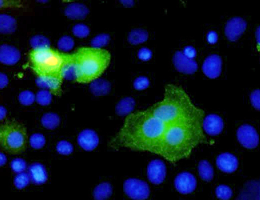Candidate vaccine against MERS passes first test

In collaboration with colleagues in Rotterdam, an LMU research team led by Professor Gerd Sutter has produced the first candidate vaccine against the MERS virus, a novel and highly pathogenic coronavirus.
Last autumn, health authorities were alarmed by reports of the isolation of a previously unknown and highly virulent coronavirus from humans. The strain causes an acute respiratory syndrome and induces severe, and often fatal, lung damage. All 108 confirmed infections, including those identified in Germany and other parts of Europe, involved patients from the Arabian Peninsula and the Middle East. Hence, the virus responsible has been named "Middle East Respiratory Syndrome Coronavirus (MERS-CoV)". The virus is thought to have merged from an animal reservoir, but its primary source has yet to be discovered. Nevertheless, it is clear that MERS-CoV has acquired the capacity for person-to-person transmission, as relatives of the victims, as well as some hospital personnel, have been infected by direct contact with patients.
During the past several months, a team led by Professor Gerd Sutter at LMU's Institute for Infectious Diseases and Zoonoses, in collaboration with colleagues at the Erasmus Medical Center in Rotterdam and at Marburg University, has created a vaccine against the MERS virus, which they describe in the Journal of Virology. "The candidate vaccine we have developed is the first one directed against the MERS coronavirus that could be administered to humans, as an emergency measure, in the event of an epidemic," says Sutter.
Developed in less than a year
The starting point for the new vaccine was a related virus known as Modified Vaccinia virus Ankara (MVA). MVA is an attenuated strain of the virus that causes smallpox, and has been used for more than 30 years for the manufacture of smallpox vaccine. Indeed, MVA is at the heart of a worldwide effort to design and generate vaccines not only against viral pathogens but also against cancers. In this context, MVA serves as the carrier for specific antigens that elicit the production of protective antibodies in the immunized host. MERS-CoV is known to bind to human cells via its so-called spike (S) protein, which is exposed on the surface of its membrane envelope. Sutter and his team therefore used molecular biological methods to introduce the gene for the MERS S protein into the MVA genome.
Following injection into mice, the resulting MVA-MERS-S virus particles were found to induce the production of antibodies that specifically recognized MERS-CoV and effectively blocked infection of susceptible cells in tissue culture. In order to confirm that vaccination with MVA-MERS-S also prevents the potentially lethal lung damage associated with MERS infections in humans, a suitable test system must be developed. So far, no animal hosts are known to display symptoms of comparable severity to those seen in humans upon exposure to MERS-CoV.
"We have produced the best vaccine possible given the present state of our knowledge," says Gerd Sutter. "This demonstrates that, using our method, we can fabricate a candidate vaccine within less than a year. MVA-MERS-S could be used as it stands for the production of a vaccine." So if the coronavirus were to give rise to a full-fledged epidemic, the vaccine could be made available rapidly. – And the same method can be used to construct immunogenic particles that induce protective immunity against other viral pathogens, enabling the production of candidate vaccines within a similarly short period of time.
More information: jvi.asm.org/content/early/2013 … VI.01672-13.abstract














